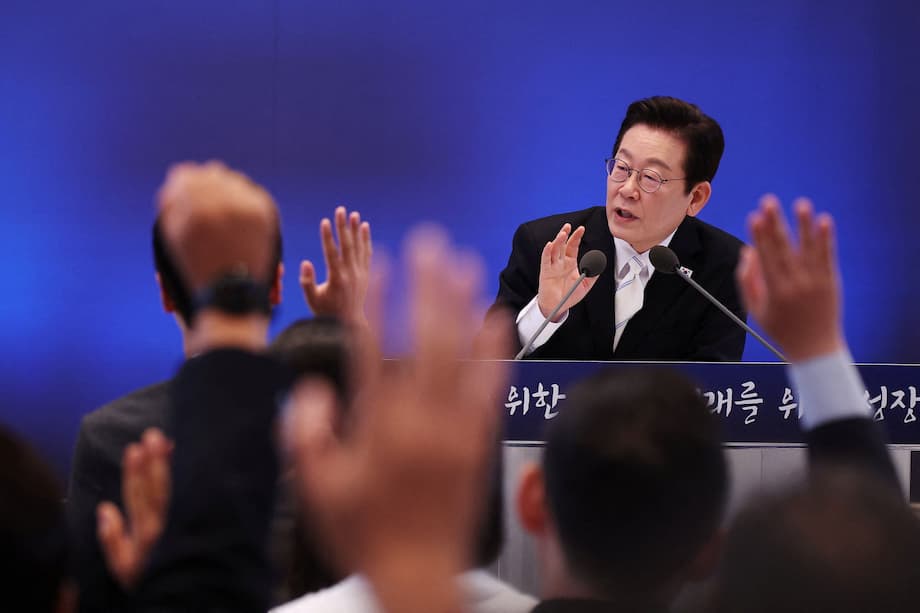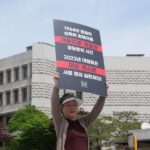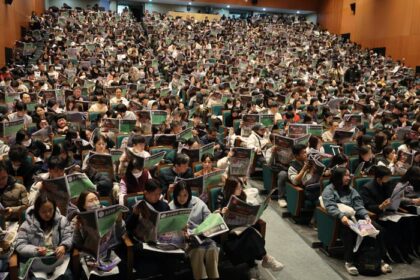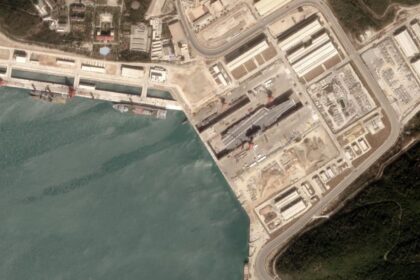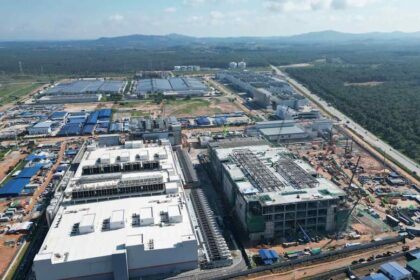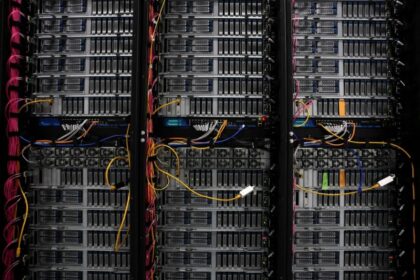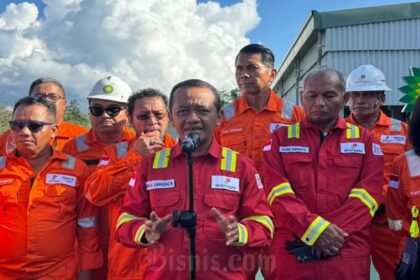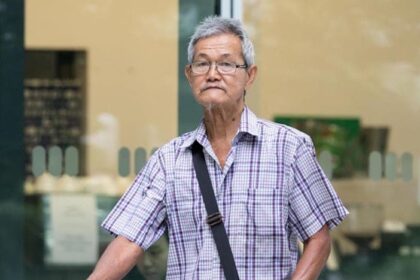A raid that jolted an alliance
Hundreds of South Korean technicians and other workers were detained during a dramatic immigration enforcement action at an electric vehicle battery complex in Ellabell, Georgia. Immigration and Customs Enforcement agents, supported by Homeland Security Investigations and other federal teams, arrested 475 people at the Hyundai and LG Energy Solution joint venture site. Roughly 300 of those detained were South Korean nationals. The multi agency operation halted work on a project that Georgia leaders had promoted as a pillar of the state economy. It also touched a nerve in Seoul, where images of workers in restraints stirred anger and alarm.
- A raid that jolted an alliance
- What happened inside the Georgia site
- Why so many Korean technicians were present
- The visa puzzle at the heart of the dispute
- How both governments responded
- Business fallout and the investment question
- Human cost and public anger in South Korea
- What the law says about departure and reentry
- Allies with shared goals, and a policy gap to close
- What comes next for the workers and the project
- What to Know
U.S. officials described the raid as a months long investigation into unlawful employment and immigration violations. South Korean officials called it a shock given the depth of the alliance and the heavy investments Korean companies have committed to factories across the United States. The episode became the largest single site enforcement action in the history of homeland security investigations. It arrived during a period when Washington has pushed allies to build critical manufacturing in the United States, particularly for batteries and clean energy supply chains.
The timing magnified the political and economic stakes. South Korean leaders had only recently met U.S. counterparts to discuss trade, investment and security. Public reaction in South Korea quickly shifted from disbelief to demands for answers about visa policies and worker protections. Business groups warned that confusion over legal pathways for specialized technicians could weigh on future projects.
What happened inside the Georgia site
The arrests unfolded at a vast manufacturing campus near Savannah that includes Hyundai’s vehicle production and a battery plant still under construction. Video released by U.S. authorities showed agents ordering lines to form, frisking some workers, and escorting detainees onto buses. Construction paused as agents executed a judicial search warrant. Federal officials said those detained either entered the United States illegally, overstayed travel authorization, or lacked permission to work.
According to South Korean and U.S. accounts, many of those held were mechanics and engineers installing production lines or calibrating imported equipment. LG Energy Solution said dozens of its employees were detained, and that many more came from partner contractors responsible for installation and testing. Hyundai said none of those arrested were direct employees of the automaker. The operation, called Operation Low Voltage, involved more than 400 officers and halted activity at one of the most high profile industrial investments in the country.
By the following week, buses took released detainees to Atlanta for a chartered flight. South Korean officials said 316 of their citizens would board, along with a small number of non Korean nationals who had also been detained at the site. The flight to Seoul, delayed once by procedural issues on the U.S. side, was scheduled to arrive the next day.
Why so many Korean technicians were present
Electric vehicle battery factories rely on specialized machinery that is designed, built, and calibrated by a small pool of engineers and technicians. During construction and early commissioning, companies often bring in vendor specialists to install lines, train local teams, and troubleshoot. That need is especially acute for Korean battery makers that have developed proprietary processes over decades. Local hiring is expanding, but there is a gap between the scale of projects underway and the number of U.S. workers with hands on experience installing and tuning these specific systems.
Industry experts have warned that visa rules do not fit this reality. Many of the jobs are temporary, highly technical, and rotation based, which does not map neatly onto visa categories designed either for tourists and business visitors or for long term employment. Executives say that when approvals take many months, construction schedules slip, and companies sometimes use third party contractors who attempt to move teams on short notice under travel programs that forbid hands on work. When that happens, workers and companies face legal risk, and projects face sudden disruption, as seen in Georgia.
South Korean firms say they are scaling up training pipelines for U.S. employees and building permanent local teams. They still need short visits by experienced specialists to install equipment and transfer knowledge. The challenge is finding lawful, reliable avenues to bring them in quickly enough to keep multi billion dollar projects on schedule.
The visa puzzle at the heart of the dispute
Several overlapping visa rules sit at the center of this controversy. The Visa Waiver Program allows citizens of South Korea and other partner countries to travel to the United States for up to 90 days for tourism or routine business meetings. It does not permit employment or hands on work. The B 1 and B 2 visitor visas are similar in scope. Employment authorization usually requires one of a handful of work visas, each with constraints that can be hard to meet for short, project based technical assignments.
Why common visas often fall short
The H 1B is capped annually and aimed at specialty occupations that typically require a bachelor’s degree or higher, often in roles that are ongoing in nature. The L 1 allows intracompany transfers for executives, managers, and employees with specialized knowledge, but documentary requirements are stringent and processing can be slow. The E 2 investor route can cover employees of qualifying companies from treaty countries, but eligibility and timing can still clash with construction schedules. None of these categories authorize work under the Visa Waiver Program or on standard business visitor status.
South Korea’s president, Lee Jae Myung, linked investment decisions to the ability to move skilled teams lawfully and predictably. He pressed for practical fixes.
In remarks marking his 100th day in office, President Lee urged Washington to create a clearer path for project related travel and work authorization for skilled Korean personnel supporting factories across the United States.
We are urging the US side to normalize the visa process related to investment, whether by securing sufficient visa quotas or by creating a new category of visa.
Lawmakers in Washington have floated ideas. One proposal known as the Partner with Korea Act would create visas tailored to Korean professionals, although it has not advanced. Seoul also suggested a bilateral working group to prevent similar incidents and asked that those who comply with voluntary departure not face future travel penalties for project related business.
How both governments responded
After days of negotiations, Seoul announced a deal with Washington to release hundreds of its citizens and allow them to return home on a charter plane. Kang Hoon sik, chief of staff to President Lee, told officials that administrative steps remained, but the repatriation was set. South Korea’s foreign ministry said President Donald Trump temporarily paused deportation procedures to hear Seoul’s position on the workers’ future in the United States.
South Korean officials emphasized safety and speed of movement above all else. They requested that detainees be transported without handcuffs or other restraints, and they pressed for voluntary departure rather than formal deportation where possible. Voluntary departure, if granted and completed as ordered, can reduce the risk of multi year reentry bars that can follow certain deportation outcomes. U.S. officials said the process would move quickly and that the repatriation schedule would be honored.
President Trump addressed foreign investors directly on social media, saying they are welcome to bring expertise within the law and to train American workers for specialized roles.
Your Investments are welcome, and we encourage you to LEGALLY bring your very smart people, with great technical talent, to build World Class products, and we will make it quickly and legally possible for you to do so. What we ask in return is that you hire and train American Workers.
Business fallout and the investment question
The Georgia complex is among the largest industrial investments in state history, with a total price tag that exceeds 12 billion dollars when vehicle and battery facilities are counted together. Georgia’s governor has called it the biggest economic development project the state has ever landed. The battery plant is critical to Hyundai’s electric vehicle rollout and to meeting U.S. content rules tied to federal tax credits. Any prolonged disruption would ripple through suppliers and timelines.
Corporate leaders moved quickly. Hyundai said it is cooperating with authorities and reviewing compliance among contractors. LG Energy Solution suspended certain travel and told employees on short visit status not to report to work. The company said dozens of its own staff had been detained, along with a larger group from equipment partners. Industry groups warned that unclear visa pathways for short assignments could drive up costs and complicate technology transfer, which is a key part of new factory ramp ups.
Business advocates in Seoul described a wave of disappointment and anger among Korean executives. At the same time, several leaders said the alliance is resilient, and that clear rules could restore confidence. Investors, they argue, need predictable and timely processes to bring in the field engineers who install and certify specialized equipment, then hand off operations to permanent U.S. teams.
Human cost and public anger in South Korea
The optics of the raid resonated strongly in South Korea. Photos and video that showed rows of workers in restraints being escorted onto buses fueled a sense of humiliation among many viewers. A national poll cited by local media found a majority of respondents viewed the measures as excessive, while a smaller share said the crackdown was inevitable. Families struggled to reach detained relatives, with legal representatives describing conditions at a Georgia processing center as crowded and unpleasant. A BBC interview with a worker described panic as arrests unfolded and some tried to flee on foot.
Opposition politicians in Seoul seized on the issue. Lawmakers questioned the treatment of Korean nationals and called for reciprocity in visa enforcement, even proposing investigations into whether some Americans in Korea work without proper authorization. Senior South Korean diplomats pressed Washington to prevent heavy handed scenes in future enforcement actions involving Korean nationals and companies. The foreign ministry stressed that while law enforcement must proceed, rights and dignity should be protected.
President Lee’s office struck a firm but measured tone, promising to bring citizens home swiftly and to pursue lasting fixes so that project work continues without legal jeopardy.
In a briefing to ruling party leaders, Kang Hoon sik laid out the priority.
We will not let our guard down until we have our people safely back home.
What the law says about departure and reentry
For the individuals involved, the path out of detention matters greatly for any future return to the United States. Voluntary departure, if approved by an immigration judge or by the Department of Homeland Security, allows a person to leave at their own expense by a set date. When completed properly, it can avoid certain bars tied to removal orders. Deportation, by contrast, can trigger time based reentry bans, and overstays of unlawful presence can carry additional penalties. Unauthorized employment can also complicate eligibility for new visas. Each case depends on individual history, including length of stay and prior status.
U.S. and South Korean officials discussed a process under which Korean nationals would depart quickly, then, if companies still require their specialized skills, reapply for appropriate status. South Korea asked the United States to ensure that those who cooperate with departure are not disadvantaged in later business travel. Legal experts say individuals who overstayed or worked without authorization will face hurdles even with voluntary departure, though careful case preparation and clear sponsorship can help in some categories.
The wider enforcement investigation continues. U.S. authorities have accused contractors of unlawful hiring, and have suggested that foreign labor displaced American workers. Companies dispute that claim, saying the detained technicians were temporary specialists brought in to install equipment and train local hires. Any charges, if filed, would come later as investigators review documents seized under the warrant.
Allies with shared goals, and a policy gap to close
Seoul and Washington have spent years strengthening economic ties alongside defense cooperation. The Korea U.S free trade agreement expanded market access. Recent U.S. laws aimed at building domestic capacity in semiconductors, batteries, and clean energy have nudged trusted partners to put factories on American soil. Korean companies responded with projects worth many billions of dollars across Georgia, Tennessee, Alabama, Texas, and beyond. Those commitments align with U.S. goals to build resilient supply chains and create manufacturing jobs.
Executives and diplomats now say visa rules must catch up with that strategy. The Georgia raid exposed a tension between expansive factory building and strict labor and immigration enforcement. Business leaders argue that a targeted visa track for short duration technical work would reduce the temptation to rely on contractors using travel categories that do not allow hands on tasks. Lawmakers in both countries have started to explore options, from new quotas for skilled Korean nationals to clearer guidance for factory related projects.
President Lee linked visa clarity directly to future investment decisions. The message landed with U.S. officials who want the projects to succeed but also aim to enforce immigration law. The next few months will test whether both governments can deliver a predictable system that allows lawful, time limited access for essential specialists while the U.S. workforce scales up.
What comes next for the workers and the project
The first group of released detainees began the journey back to Seoul on a chartered flight from Atlanta. South Korea said the United States respected its request to move quickly, and that both sides would continue talks on how to resume needed technical work under legal status. Construction on the battery plant is expected to restart as companies adjust staffing and compliance procedures. Hyundai has said vehicle production at the adjacent facility continues.
Attorneys representing some detainees say their clients had valid visas and were providing technical guidance rather than filling regular jobs. U.S. officials maintain that the people detained were not authorized to work. Those questions will be sorted as individual cases proceed and as agencies scrutinize contractors. The bigger test is policy. A lasting arrangement that provides lawful, timely access for project based specialists would reduce risk and keep construction on schedule. Absent that, companies warn of slower timelines and higher costs, with ripple effects across the electric vehicle supply chain.
South Korea’s foreign minister discussed potential new visa categories with U.S. Secretary of State Marco Rubio. Seoul proposed a working group to prevent repeats of the Georgia scene, and requested that those who depart voluntarily not be penalized in future business travel. Business groups, including the American Chamber of Commerce in Seoul, urged both governments to use the episode to clarify rules so that investments can proceed smoothly.
What to Know
- ICE and Homeland Security Investigations detained 475 workers at a Hyundai LG battery site in Ellabell, Georgia, with about 300 South Korean nationals among them.
- U.S. officials said the operation followed a months long investigation into unlawful employment and immigration violations, calling it the largest single site action in the agency’s history.
- South Korea negotiated the release of hundreds of its citizens and arranged a chartered flight from Atlanta to Seoul; officials prioritized voluntary departure over deportation.
- President Lee Jae Myung warned that uncertainty over visas for skilled technicians could affect future Korean investment in the United States.
- President Donald Trump said foreign investors are welcome to bring skilled workers legally and to train American workers for specialized roles.
- Hyundai said none of the detainees were its direct employees; LG Energy Solution paused some travel and said employees of partner firms were among those held.
- The visa waiver program does not allow employment, and common work visas often do not fit short, project based technical assignments needed during factory construction.
- Seoul and Washington discussed creating clearer pathways or new visa categories for Korean professionals tied to investment projects.
- Construction paused at the battery plant but vehicle production at the broader complex continued; companies pledged to cooperate with investigators.
- Business groups in both countries urged a policy fix to avoid future disruptions and keep major clean energy investments on track.


